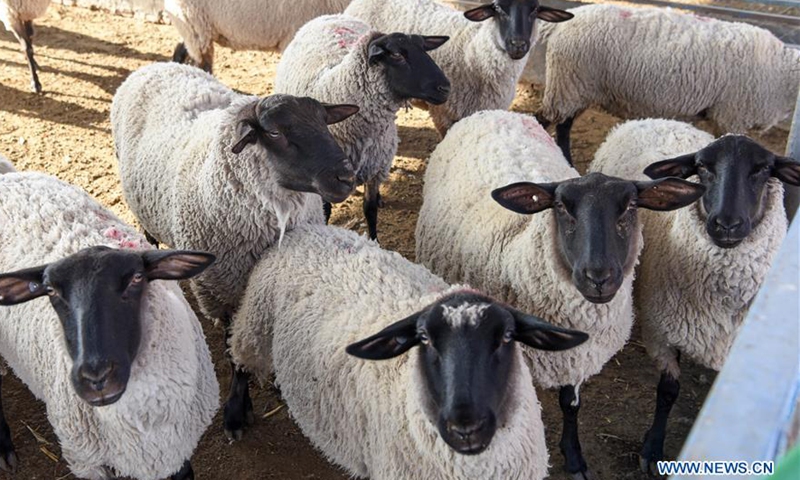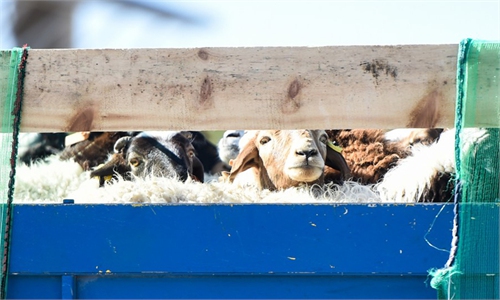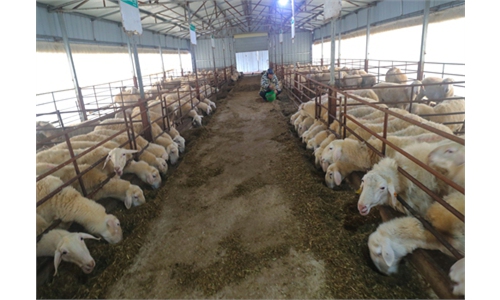Gene editing to help China reduce dependence on livestock imports: experts
Nation strives to boost meat production capacity, reduce import dependence

File photo:Xinhua
Advanced technologies such as gene editing can help China reduce its dependence on livestock imports, Chinese agricultural experts said, after the world's first myostatin gene (MSTN) edited Huyang sheep was born in China, with the technology used to boost the animal's meat production and lean meat percentage.
Researchers at the Jiangsu Academy of Agricultural Sciences edited the MSTN, a negative regulator of muscle mass, of Huyang sheep, and they have produced five sheep so far, the Science and Technology Daily reported on Thursday.
The growth rates of two out of the five sheep were faster, and their weights at two months were 25 percent higher than normal.
"The gene-editing technology could be a way to improve the production of mutton and the percentage of lean meat. If there is no big difference between the edited sheep and foreign breeds, or the edited sheep mature faster and better than foreign ones, it will greatly reduce China's dependence on imports of livestock," Wang Zuli, deputy researcher at the Institute of Agricultural Economics and Development at the Chinese Academy of Agricultural Sciences, told the Global Times on Thursday.
The Huyang sheep breed is unique for its high fertility rate and resistance to humid heat, which is why it is so widely raised across China.
However, the meat production capacity of Huyang sheep needs to rise to meet demand in China, a large mutton consumer, and gene-editing technology could help.
In recent years, Chinese consumption of mutton has risen annually, but the mutton yield cannot satisfy demand. In 2019, Chinese consumption of mutton hit 5.27 million tons, higher than the domestic yield of 4.88 million tons, the report said.
Mutton from Australia and New Zealand accounted for 97.6 percent of China's mutton imports in 2019, according to china.com.
Meanwhile, stricter environmental protection policies in China have led to some small and medium-sized sheep farmers exiting the market, and the breeding stock of sheep has declined in recent years.
As a result, Chinese agricultural experts warned that Chinese firms may face higher prices in agriculturally developed countries, such as New Zealand and the US, where the pedigree animal husbandry markets are monopolized by large domestic companies.
A large part of China's husbandry breeding relies on overseas pedigree animal sources, such as frozen cattle semen, white-feathered chickens and lean hogs, Ma Wenfeng, a senior analyst at the Beijing Orient Agribusiness Consultancy, told the Global Times on Thursday.
"We import those pedigree animals for their high feed conversion ratio to satisfy rising consumption demand," Ma said.
In addition, some foreign piglets have better body types, higher lean meat percentages and faster growth rates, according to Wang. "Some of our hogs grow 60-70 kilograms a year. In contrast, imported breeds can grow 120 kilograms in six months," Wang noted.
The main difficulties in China's meat production lie in high costs, which are related to fodder, he pointed out. "Breeding hogs in China costs 40 percent more than in the US."
China is striving to develop animal breeding abilities and techniques, with many companies developing new types of broilers and sheep through the use of advanced technologies, Ma said.
Ma said there are a lot of potential high-quality pedigree animal resources in China, but the industrialization of breeding takes years to achieve, so systems should be established to incentivize farmers.




